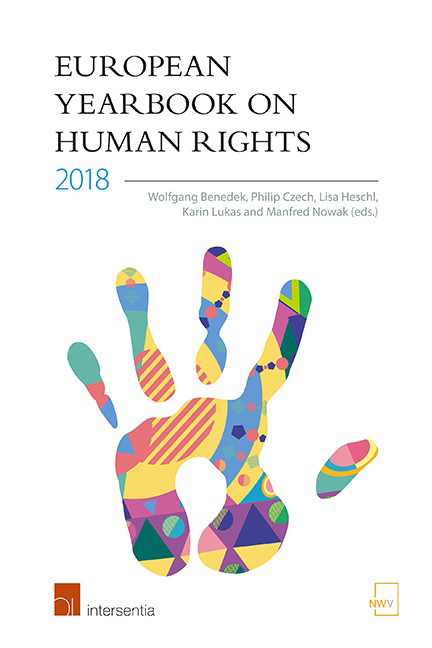Book contents
- Frontmatter
- Scientific Advisory Board
- Editors’ Preface
- Contents
- List of Abbreviations
- List of Contributors
- Part I Topic Of The Year
- Part II Eu
- Part III Coe
- The Jurisprudence of the European Court of Human Rights in 2017
- A Decade of Violations of the European Convention on Human Rights: Exploring Patterns of Repetitive Violations
- The Boundaries to Dialogue with the European Court of Human Rights
- Unprincipled Disobedience to International Decisions: A Primer from the Russian Constitutional Court
- The Impact of ECtHR and CJEU Judgments on the Rights of Asylum Seekers in the European Union: Adversaries or Allies in Asylum?
- The Human Right to Leave Any Country: A Right to be Delivered
- Some Reflections on the Principle of the Best Interests of the Child in European Expulsion Case Law
- Salafism in Europe: A Legal and Political Analysis of Human Rights and Security
- Delays in the Implementation of ECtHR Judgments: The Example of Cases Concerning Electoral Issues
- PART IV OSCE
- Part V Others
- Part VI Book Reviews
- Index
Unprincipled Disobedience to International Decisions: A Primer from the Russian Constitutional Court
from Part III - Coe
Published online by Cambridge University Press: 31 January 2019
- Frontmatter
- Scientific Advisory Board
- Editors’ Preface
- Contents
- List of Abbreviations
- List of Contributors
- Part I Topic Of The Year
- Part II Eu
- Part III Coe
- The Jurisprudence of the European Court of Human Rights in 2017
- A Decade of Violations of the European Convention on Human Rights: Exploring Patterns of Repetitive Violations
- The Boundaries to Dialogue with the European Court of Human Rights
- Unprincipled Disobedience to International Decisions: A Primer from the Russian Constitutional Court
- The Impact of ECtHR and CJEU Judgments on the Rights of Asylum Seekers in the European Union: Adversaries or Allies in Asylum?
- The Human Right to Leave Any Country: A Right to be Delivered
- Some Reflections on the Principle of the Best Interests of the Child in European Expulsion Case Law
- Salafism in Europe: A Legal and Political Analysis of Human Rights and Security
- Delays in the Implementation of ECtHR Judgments: The Example of Cases Concerning Electoral Issues
- PART IV OSCE
- Part V Others
- Part VI Book Reviews
- Index
Summary
ABSTRACT
This article uses the opportunity of a decision by the Russian Constitutional Court (RCC) to test whether unprincipled disobedience can be detected. Disobedience indicates the refusal, by domestic authorities, to implement the binding decisions of international courts and tribunals. Unprincipled disobedience is dictated by convenience rather than principled reasons. In Yukos, the Russian Court declared the eponymous judgment of the European Court of Human Rights (ECtHR) impossible to execute, for incompatibility with the Russian Constitution. The reasons put forward by the Russian judges are deeply problematic from the perspective of constitutional and international law. The fragility of this decision‘s arguments reveals the real motives of the RCC and qualifies its decision as a glaring instance of unprincipled disobedience.
INTRODUCTION
On 19 January 2017, the Russian Constitutional Court (RCC) delivered a decision concerning the execution of the European Court of Human Rights (ECtHR)‘s judgment against Russia in the Yukos case. In this decision, the RCC answered the Ministry of Justice‘s official request to consider whether Russia could, under its Constitution, comply with the ECtHR‘s order to pay just satisfaction to the applicant.
The RCC found that Russia‘s compliance with the ECtHR‘s decision would breach its Constitution and the judgment was, therefore, ‘ impossible to execute ‘. This decision forms part of an increasing trend of States – prominent among them the Russian Federation – expressing disobedience towards the ECtHR‘s judgments. The decision of the RCC is legally unwarranted as it subordinated international obligation to ordinary Russian legislation and prior decisions of the RCC. It is also argued that the RCC‘s disagreement with the principles of the Yukos judgment by the ECtHR is a cover-up. What prompted the RCC‘s decision was the government‘s unwillingness to pay major monetary compensation to the shareholders of Yukos.
Any failure to enforce a judgment of the ECtHR is a violation of international law. Although the reasons for non-enforcement do not matter from the legal point of view, they may add some legitimacy to the State‘s resistance. De Londras and Dzehtsiarou elaborated the theoretical distinction between principled disobedience and dilatoriness.
- Type
- Chapter
- Information
- European Yearbook on Human Rights 2018 , pp. 319 - 342Publisher: IntersentiaPrint publication year: 2018



